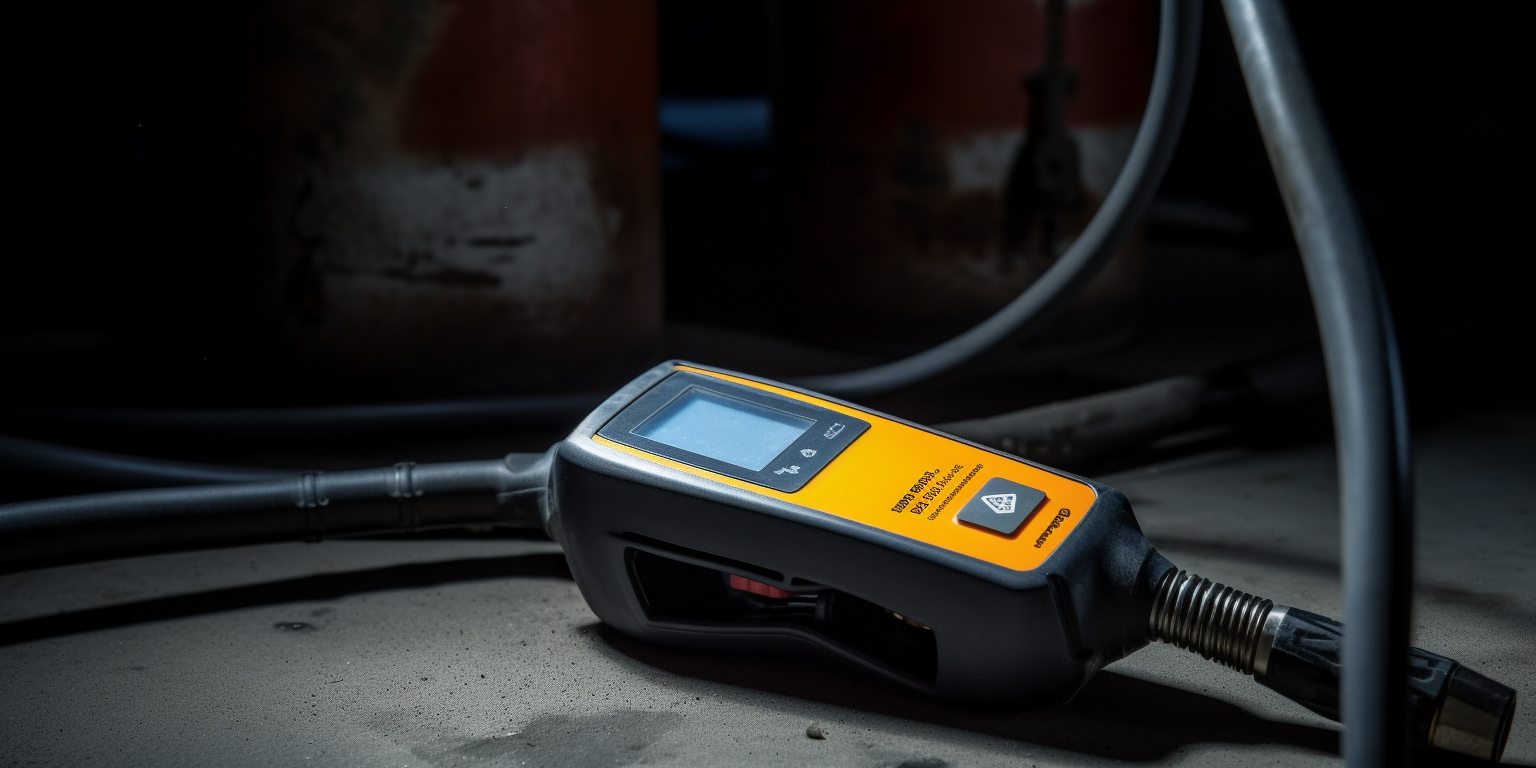A Refrigerant Leak Detector is an essential tool used frequently in the realm of industrial and commercial refrigeration. It plays a vital role in detecting any leaks of refrigerant gases, a common issue that can lead to various operational difficulties and environmental concerns.
As its name suggests, a Refrigerant Leak Detector is specifically designed to identify the presence of refrigerant gases that may escape from refrigeration systems. These gases, such as freon or ammonia, are used in large quantities in commercial and industrial refrigeration units and can be harmful if leaked into the atmosphere.
The refrigerant leak detector works by sensing the high-pressure gas in the system and alerting the user to any leaks. This helps prevent the loss of refrigerant, which can negatively impact the performance of the refrigeration unit, lead to increased energy costs, and potentially harm the environment.
These detectors come in various forms, including handheld devices for spot checking, and fixed detectors for continuous monitoring of larger systems.
Regular use of a refrigerant leak detector is highly recommended in the maintenance of industrial and commercial refrigeration units. It not only ensures the efficiency and longevity of the system but also contributes significantly towards environmental protection.
Therefore, a Refrigerant Leak Detector stands as a crucial tool for anyone involved in the maintenance and operation of commercial and industrial refrigeration systems. It helps keep the system running optimally, saves costs in the long run, and plays a significant role in environmental preservation.
How does a refrigerant leak detector function in commercial and industrial settings?
A refrigerant leak detector is a vital tool in commercial and industrial settings, particularly in HVAC (Heating, Ventilation, and Air Conditioning) systems. Its primary function? To identify and locate refrigerant leaks, which if left unchecked, can pose potential health risks and reduce the efficiency of the system.
In operation, the leak detector works in a simple yet effective manner. It’s equipped with sensors capable of detecting refrigerant gases in the atmosphere. When you place this device near a suspected leak, it analyzes the air for the presence of any refrigerant gases.
Commercial and industrial environments often have complex, extensive HVAC systems. Refrigerant leak detectors play a key role in maintaining these. Regular use of a leak detector can pinpoint problem areas, preventing minor issues from escalating into major, cost-intensive repairs.
In commercial settings like offices and shopping malls, where comfort is paramount, refrigerant leak detectors ensure the HVAC systems are working at their best. Leaks can lead to a drop in cooling or heating efficiency, impacting the comfort levels within the space. Identifying these leaks early keeps systems running optimally and maintains a pleasant indoor climate.
In industrial scenarios, the role of a refrigerant leak detector goes beyond comfort. Industries such as food processing or pharmaceuticals need precise temperature control. Here, a refrigerant leak could compromise product quality or safety standards. The detector helps avoid such scenarios, keeping operations smooth and up to the mark.
What are the key features to look for when purchasing a leak detector for refrigerants?
When buying a refrigerant leak detector, several key features can ensure you’re making a smart investment. Firstly, sensitivity is paramount. Can the detector sense small leaks? High-quality detectors can identify leaks as small as 0.1 ounces per year. Next, consider the speed of response. After all, time is of the essence when you’re tracking a leak. A quick-responding detector can save you precious minutes.
Durability is also a significant factor. Look for a rugged, well-built detector that can withstand the rigors of daily use. It’s equally important to check the battery life. You don’t want to be in the middle of a critical task and have your detector die on you. A good detector should have a battery life of at least eight hours.
User-friendliness is another crucial aspect. A detector with a clear display and intuitive controls makes the task of finding leaks much easier. Additionally, some detectors come with built-in LED lights, which can be beneficial when working in poorly-lit conditions.
Lastly, think about the type of refrigerant you’ll be working with. Ensure the detector is compatible with the specific refrigerant you use. Remember, a detector that works well with a wide range of refrigerants provides greater versatility.
So, there you have it – sensitivity, response speed, durability, battery life, user-friendliness, light source, and refrigerant compatibility. These are the key features to look for when purchasing a refrigerant leak detector. With these in mind, you’re sure to make a wise choice!
What are the potential impacts of refrigerant leaks on the environment and how can leak detectors help mitigate these effects?
Refrigerant leaks pose a significant threat to our environment. When these substances escape into the atmosphere, they have the potential to cause considerable harm. They are potent greenhouse gases with a much higher capacity for heat-trapping than carbon dioxide, accelerating the pace of global warming. Additionally, certain types of refrigerants, known as chlorofluorocarbons (CFCs) and hydrochlorofluorocarbons (HCFCs), contribute to the depletion of the ozone layer, leaving us more exposed to the sun’s harmful ultraviolet rays.
However, there’s a silver lining: leak detectors. These handy devices enable us to identify and address leaks promptly, reducing both the amount of refrigerant released into the atmosphere and the negative environmental impacts. They function by sensing the presence of refrigerants in the air and signaling a leak through visual or auditory alarms.
Regular use of leak detectors in refrigeration and air conditioning systems is a simple yet effective way to mitigate the environmental impacts of refrigerant leaks. By identifying leaks early, we not only conserve the refrigerant and prolong the life of the equipment but also contribute to the fight against global warming and ozone layer depletion. Therefore, investing in a high-quality leak detector is not just an investment in your equipment, but also an investment in our planet. Let’s do our part to ensure a sustainable future for generations to come.
How do leak detectors contribute to the overall efficiency of refrigeration systems?
Leak detectors play a crucial role in maintaining the efficiency of refrigeration systems. Imagine if a refrigeration system could speak up when there’s a problem – well, that’s exactly what a leak detector does! This ingenious device actively identifies refrigerant leaks, a common issue that can significantly hamper the system’s performance.
Now, how does this contribute to efficiency? The answer is simple! When a refrigerant leak occurs, the cooling capacity of your refrigeration system drops. That means your system has to work harder, using more energy, to achieve the desired temperature. However, by using a leak detector, you can discover these leaks early, before they start to impact your system’s performance.
But it doesn’t stop there. A leak detector also helps in preventing the unnecessary release of refrigerants into the atmosphere. This not only saves you money in terms of refrigerant costs but also contributes to environmental protection.
In sum, leak detectors are like the silent guardians of refrigeration systems. They relentlessly monitor the health of the system, ensure optimal performance, and contribute significantly to energy efficiency and environmental sustainability. So, if you want your refrigeration system to run smoothly and efficiently, getting a leak detector is certainly a smart move!
How often should a refrigerant leak detector be serviced or replaced in an industrial or commercial setting?
In an industrial or commercial setting, maintaining your refrigerant leak detector’s efficiency is crucial for ensuring safety and cost-effectiveness. Service intervals can vary based on usage, yet as a general guideline, a semi-annual or annual servicing is advisable. During these servicing appointments, professionals conduct a thorough inspection and calibration, ensuring the leak detector functions optimally and accurately.
However, frequent, heavy usage, or demanding work environments may necessitate more frequent check-ups. It’s prudent to consult with your equipment manufacturer or service provider for tailored advice based on your specific circumstances.
As for replacement, a refrigerant leak detector typically has a lifespan of around five to ten years. However, this too can vary based on usage patterns and the quality of maintenance. Signs that your leak detector may need replacing include consistent inaccuracies, frequent need for repairs, or difficulty sourcing replacement parts.
Regular servicing and timely replacement of your refrigerant leak detector not only ensures safety and regulatory compliance but also avoids costly refrigerant losses and equipment damage. Remember, proactive maintenance is always better than reactive repairs. Stay ahead with scheduled check-ups and enjoy the peace of mind that comes with a well-maintained refrigerant management system.
How can software help in maintaining a Refrigerant Leak Detector?
Software plays a crucial role in maintaining the efficiency and longevity of a Refrigerant Leak Detector. First off, it assists with real-time monitoring. A modern Refrigerant Leak Detector is often equipped with software that tracks its performance and provides immediate alerts in case of any irregularities or potential leaks. This allows for proactive maintenance, preventing minor issues from escalating into major ones.
In addition, software aids in data analysis. By analyzing usage patterns and operational data, the software can provide valuable insights into when and where leaks are most likely to occur. This data-driven approach leads to more effective, targeted maintenance, reducing both time and cost.
Another advantage of software is its role in predictive maintenance. Artificial Intelligence (AI) and Machine Learning (ML) algorithms can be used to predict potential failures based on historical data and usage patterns. This helps in scheduling maintenance tasks well in advance, ensuring that the Refrigerant Leak Detector is always in optimal working condition.
Lastly, software enhances the convenience of maintenance. With features like remote access and control, you can monitor and manage your Refrigerant Leak Detector from anywhere, anytime. This not only makes maintenance easier but also increases the overall uptime of the device.
Key Takeaways:
- Leak detectors in refrigeration and air conditioning systems help mitigate environmental impacts of refrigerant leaks, conserve the refrigerant, prolong the life of the equipment, and contribute to the battle against global warming and ozone layer depletion.
- Leak detectors maintain the efficiency of refrigeration systems by identifying refrigerant leaks, preventing the unnecessary release of refrigerants into the atmosphere, and ensuring optimal performance and energy efficiency.
- In an industrial or commercial setting, a semi-annual or annual servicing of the refrigerant leak detector is recommended for optimal performance. The leak detector typically has a lifespan of around five to ten years, depending on usage patterns and maintenance quality.
- Software enhances the efficiency and longevity of a Refrigerant Leak Detector by assisting with real-time monitoring, data analysis, predictive maintenance, and remote access and control. This data-driven approach leads to more effective, targeted maintenance.



